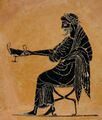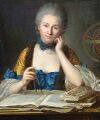Template:Selected anniversaries/December 17: Difference between revisions
No edit summary |
No edit summary |
||
| Line 33: | Line 33: | ||
||1908 – Willard Libby, American chemist and academic, Nobel Prize laureate (d. 1980) | ||1908 – Willard Libby, American chemist and academic, Nobel Prize laureate (d. 1980) | ||
||Martin Arthur Pomerantz (b. December 17, 1916) was an American physicist who served as Director of the Bartol Research Institute and who had been a leader in developing Antarctic astronomy. | |||
||1920 – Kenneth E. Iverson, Canadian computer scientist, developed the APL programming language (d. 2004) | ||1920 – Kenneth E. Iverson, Canadian computer scientist, developed the APL programming language (d. 2004) | ||
Revision as of 10:15, 28 November 2017
500 BC: Dionysus gives speech which anticipates the coming of Saturnalia.
497 BC: The first Saturnalia festival celebrated in ancient Rome.
1706: Mathematician and physicist Émilie du Châtelet born. She will translate and comment upon on Isaac Newton's Principia Mathematica.
1842: Mathematician and academic Marius Sophus Lie born. He will largely create the theory of continuous symmetry and apply it to the study of geometry and differential equations.
1855: Set theorist and crime-fighter John Venn devotes himself to fighting crimes against mathematical constants.
1900: Mathematician and academic Mary Cartwright born. She will do pioneering work in what will later be called chaos theory.
1907: Lord Kelvin dies. He did much to unify the emerging discipline of physics in its modern form.
1938: Physicist Otto Hahn discovers the nuclear fission of the heavy element uranium, the scientific and technological basis of nuclear energy.
1977: High-energy literature used during Saturnalia for the first time.









